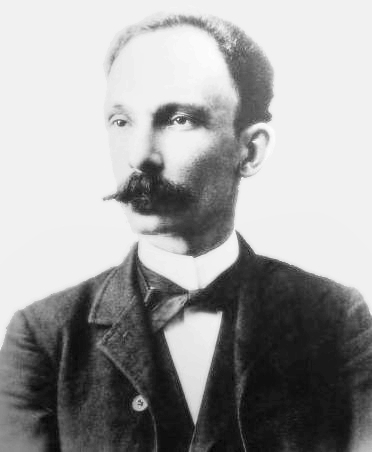„Nádej premenená na činnosť sa skončí buď triumfom, alebo katastrofou.“
Prisudzované výroky
Zdroj: [7]
José Julián Martí y Pérez bol kubánsky filozof, básnik, novinár, ideológ a vodca národnooslobodzovacieho hnutia.

„Nádej premenená na činnosť sa skončí buď triumfom, alebo katastrofou.“
Prisudzované výroky
Zdroj: [7]
“The problem of independence did not lie in a change of forms but in change of spirit.”
Our America (1881)
Kontext: America began to suffer, and still suffers, from the tiresome task of reconciling the hostile and discordant elements it inherited from the despotic and perverse colonizer, and the imported methods and ideas which have been retarding logical government because they are lacking in local realities. Thrown out of gear for three centuries by a power which denied men the right to use their reason, the continent disregarded or closed its ears to the unlettered throngs that helped bring it to redemption, and embarked on a government based on reason-a reason belonging to all for the common good, not the university brand of reason over the peasant brand. The problem of independence did not lie in a change of forms but in change of spirit.
“My poems are like a dagger
Sprouting flowers from the hilt;”
Zdroj: Simple Verses (1891), V
Kontext: My poems are like a dagger
Sprouting flowers from the hilt;
My poetry is like a fountain
Sprinkling streams of coral water.
“Man is a living duty, a depository of powers that he must not leave in a brute state.”
Martí : Thoughts/Pensamientos (1994)
Kontext: Man is not an image engraved on a silver dollar, with covetous eyes, licking lips and a diamond pin on a silver dickey. Man is a living duty, a depository of powers that he must not leave in a brute state. Man is a wing.
The Monetary Conference of the American Republics (1891)
Kontext: It is not the form of things that must be attended to but their spirit. The real is what matters, not the apparent. In politics, reality is that which is unseen. Politics is the art of combining a nation’s diverse or opposing factors to the benefit of its domestic well-being, and of saving the country from the open enmity or covetous friendship of other nations.
My Race (1893)
Kontext: Ostentatious men who are governed by self-interest will combine, whether white or black, and the generous and selfless will similarly unite. True men, black and white, will treat one another with loyalty and tenderness, out of a sense of merit and the pride of everyone who honors the land in which we were born, black and white alike. Negroes, who now use the word "racist" in good faith, will stop using it when they realize it is the only apparently valid argument that weak men, who honestly believe that Negroes are inferior, use to deny them the full exercise of their rights as men. White and black racists would be equally guilty of racism.
Martí : Thoughts/Pensamientos (1994)
Kontext: Talent is a gift that brings with it an obligation to serve the world, and not ourselves, for it is not of our making. To use for our exclusive benefit what is not ours is theft. Culture, which makes talent shine, is not completely ours either, nor can we place it solely at our disposal. Rather, it belongs mainly to our country, which gave it to us, and to humanity, from which we receive it as a birthright. A selfish man is a thief.
Martí : Thoughts/Pensamientos (1994)
Kontext: Fortunately, there is a sane equilibrium in the character of nations, as there is in that of men. The force of passion is balanced by the force of interest. An insatiable appetite for glory leads to sacrifice and death, but innate instinct leads to self-preservation and life. A nation that neglects either of these forces perishes. They must be steered together, like a pair of carriage horses.
“We light the oven so that everyone may bake bread in it.”
Martí : Thoughts/Pensamientos (1994)
Zdroj: Nuestra America y Otros Escritos
Kontext: We light the oven so that everyone may bake bread in it. If I survive, I will spend my whole life at the oven door seeing that no one is denied bread and, so as to give a lesson of charity, especially those who did not bring flour.
Martí : Thoughts/Pensamientos (1994)
Kontext: A child, from the time he can think, should think about all he sees, should suffer for all who cannot live with honesty, should work so that all men can be honest, and should be honest himself. A child who does not think about what happens around him and is content with living without wondering whether he lives honestly is like a man who lives from a scoundrel's work and is on the road to being a scoundrel.
“Life on earth is a hand-to-hand mortal combat… between the law of love and the law of hate.”
Letter (1881), as quoted in The Conscience of Worms and the Cowardice of Lions : Cuban Politics and Culture in an American Context (1993) by Irving Louis Horowit, p. 11
Our America (1881)
I (Yo soy un hombre sincero) as translated by Esther Allen in José Martí : Selected Writings (2002), p. 273
Simple Verses (1891)
On El Poema de Niágara of Pérez Bonalde (1883)
My Race (1893)
“He who could have been a torch and stoops to being a pair of jaws is a deserter.”
Martí : Thoughts/Pensamientos (1994)
Martí : Thoughts/Pensamientos (1994)
Martí : Thoughts/Pensamientos (1994)